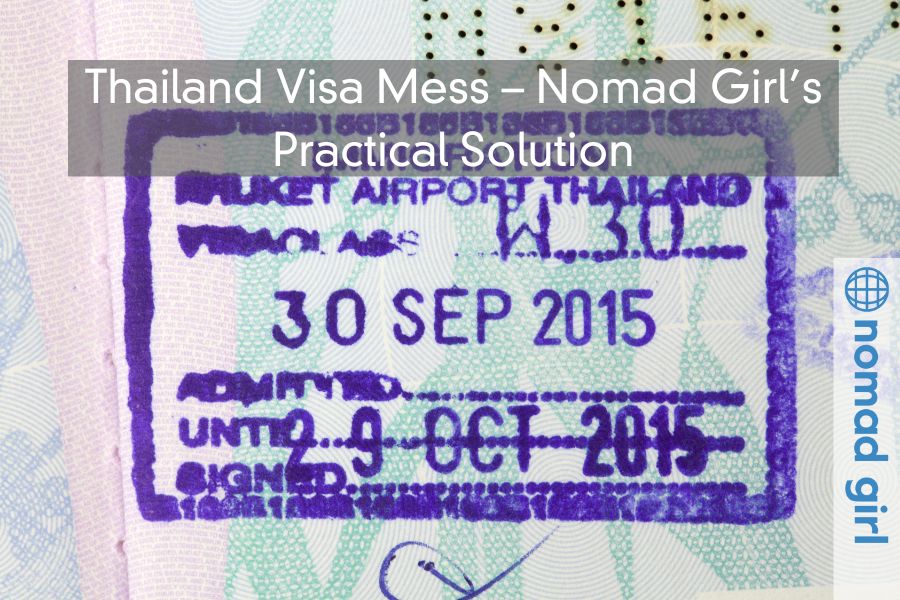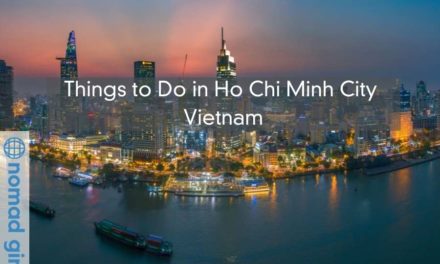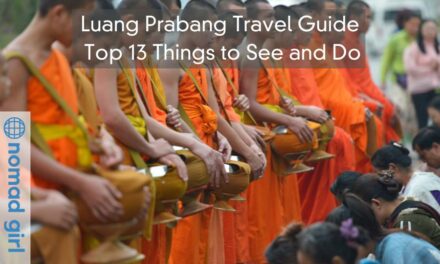The Thailand visa mess often baffles me as I observe hordes of people dedicating vast portions of their day at immigration offices for a mere 30-day extension on their tourist visas or visa exemptions.
Forking out 1,900 THB for this privilege, only to endure the costly ritual of a visa run the following month, strikes me as a testament to the deep affection many hold for this country.
The lengths people go to, flying or driving out only to return, especially when airfares have skyrocketed post-pandemic, are indicative of their desire to extend their stay in Thailand despite the bureaucratic hurdles.
The available visa programs offering longer stays come with their own set of complications, often involving a bewildering amount of paperwork and, in some unfortunate cases, bribes.
The sheer number of immigration agencies scattered throughout the country further illustrates the bureaucratic maze one must navigate. I am convinced Thailand must have the highest number of immigration agencies per capita in the world. With the best ones operating within a few hundred meters from the immigration offices.
Why These Extensions and Visa Runs?
The necessity for visa extensions and runs stems from the less-than-ideal alternatives for those wishing to prolong their stay in Thailand.
Let’s break down the options, highlighting the complexity and financial implications of each:
- Non-Immigrant O extension & Non-Immigrant O-A: For individuals over 50, a 12-month stay can be secured by depositing 800,000 THB (approximately 28K USD) in a Thai bank account. Fees range from 1,900 to 25,000 THB, depending on whether you opt for an agent’s assistance.
- 10-year non-immigrant O-X visa: Exclusively for those over 50 from a select group of countries, requiring a significant bank deposit of 3,000,000.
- Educational Visa: Often tied to questionable educational programs, these visas are primarily designed to extend one’s stay under the guise of studying, with the possibility of a one-year extension.
- Business Visa: This involves setting up a business with the requirement of employing four Thai nationals for every foreigner, making it a costly and complex option for an extended stay. However talking to a friend of mine these 4 additional workers can be photoshopped into an office photo, that will be included with the application. This is Thailand.
- SMART visa: Offers five categories for professionals, with the Smart S class aiming to be as close as possible to a Digital Nomad Visa for a $3,000 fee and a 12-month duration.
- LTR Visa: Dubbed a digital nomad visa, this 10-year Long Term Residency Visa sets the bar extremely high, requiring applicants to earn at least 80,000 USD and be employed by either a publicly listed company or a private company with substantial revenue of 150 million USD over the last 3 years. Any Digital Nomad that meets these requirements raise your hands please? These ridiculous requirements again push Digital Nomads into questionable education or business visas.
- Thailand Privilege Card: A hefty investment starting at 900,000 THB for a 5-year visa, offering a way to bypass the complexities of Thai immigration bureaucracy.
Spending four to five months annually in Thailand, I’ve encountered firsthand the convolutions of the current visa system.
It seems designed more to acquaint foreigners with Thai bureaucratic procedures than to offer viable long-term stay options, leaving visa runs and extensions as the only feasible alternatives for many. Or the least painful path.
This system not only perpetuates the business for visa agencies but also employs a significant number of staff for processing these extensions, questioning the efficient use of resources.
Thailand Digital Nomad Visa & Alternatives – All Visa Options Explained
Encountering an Immigration Officer as a Visa Runner
Every time you embark on a visa run and seek re-entry into Thailand, presenting a return or onward ticket is a must. It’s essential to have this organized beforehand.
While land-based border runs are limited to just two per year, flying in offers unlimited entries. Yet, the real challenge comes when facing the immigration officer.
They may inquire about the extended duration of your stay, question why you haven’t opted for a long-term visa, or even suspect you of overstaying.
I, along with members of my family, have faced these interrogations multiple times. In each instance, we’ve had to demonstrate our onward travel plans, asserting our compliance with the rules.
Although we’ve managed to clear these hurdles each time, the experience is far from welcoming.
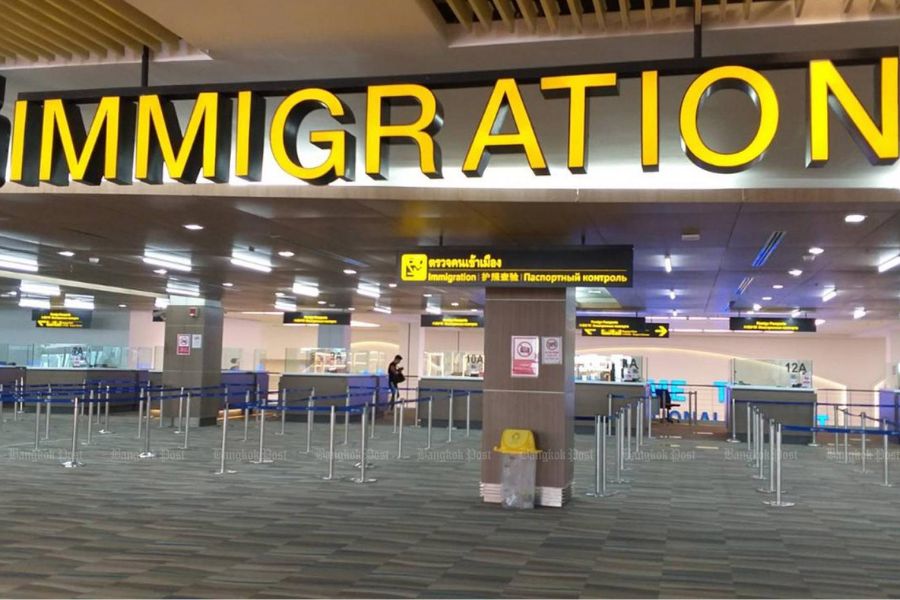
The Absence of a Digital Nomad Visa
Considering that Thailand, with its cities like Chiang Mai and Bangkok, competes for the top spot as a global haven for digital nomads as per rankings on nomadlist.com, it’s baffling that the country has yet to introduce a digital nomad visa.
Such a visa would enable individuals to reside and work remotely within Thailand for an initial period of 12 months, with the possibility of extending for an additional year.
Thailand’s Tourism Recovery Efforts
In 2023, Thailand welcomed 28 million tourists, a significant shortfall from the 42 million recorded in 2019. The reduced number of Chinese tourists, who previously visited in large numbers, has notably impacted these figures.
In response, Thailand has implemented various incentives to attract tourists and encourage longer stays.
- Russians now enjoy a 90-day visa exemption, a substantial increase from the 30-day exemption granted to other countries on the visa exemption list. China has been permanently added, while nations such as Taiwan, Kazakhstan, and India have received temporary inclusion on this list.
- To further entice visitors, Thailand now offers free travel insurance through its Thailand Travel Safety program, covering claims up to $14,000 for all tourists until August 31, 2024. Initially, this insurance was to be financed by a 300 THB tourist tax upon entry, but concerns over deterring tourists have led to hesitation in implementing the fee.
- Additionally, duties on alcohol have been suspended for a year as another strategy to draw in tourists.
These small measures might bring in some additional numbers but not in the huge numbers to close the gap. Something more is clearly needed read to what Nomad Girl has to say.
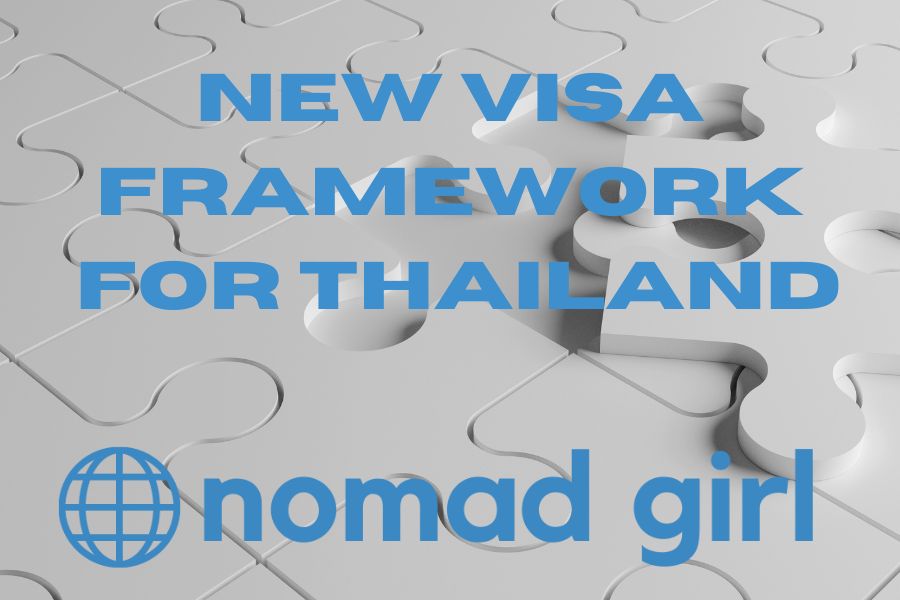
Nomad Girl’s Proposal for a New Visa Framework
Considering the convoluted visa situation and the evident affection many hold for Thailand, it prompts me to question the oversight of Thailand’s visa and tourism strategies.
Is there a method to untangle this complexity, boost Thailand’s revenue significantly, and ensure more efficient use of funds?
Here are my suggestions for revamping Thailand’s current visa policies.
1. Tourist visa with a duration-based exit fee
I propose rolling out a six-month tourist visa for those from visa-exempt and visa-on-arrival countries, featuring a sliding scale of exit fees based on the length of stay:
- Stay up to 1 month: No charge
- 2 months: 1,500 THB
- 3 months: 3,000 THB
- 4 months: 5,000 THB
- 5 months: 7,000 THB
- 6 months: 10,000 THB
After six months, individuals must exit Thailand, resetting the fee structure upon re-entry. To discourage the misuse of this system as a semi-permanent residency option, a cap of 12 months within an 18-month period is suggested.
Payment of the fee should be upon exiting the country, with an online platform available for travellers to verify their stay duration and pay accordingly.
This system should streamline processing at immigration checkpoints through the use of QR codes to show proof of the exit payment.
The current visa-on-arrival class could also be integrated in the tourist visa with a duration-based exit fee thereby simplifying the process even further. The same is true Multiple Entry Tourist Visa (METV) this can now be abolished.
By implementing such a system, Thailand can efficiently collect fees, potentially introducing a tax on remote workers like digital nomads without driving them to relocate to other countries.
This approach also aims to dispel the misconception that digital nomads evade taxes and burden the economy, you have captured an exit tax in return.
Additionally, it addresses the environmental impact of frequent visa runs. You are also optimizing aeroplane capacity for lower fares or attracting more visitors.
2. Launch a Digital Nomad Visa
Propose the creation of a digital nomad visa valid for 12 months, with the possibility of renewal for an additional year.
The cost for this visa would be set at 25,000 THB annually, a rate that exceeds the expenses associated with a duration-based tourist visa for a comparable period.
However, this digital nomad visa would offer several key advantages:
- Official documentation confirming temporary residency in Thailand, enabling digital nomads to unregister from the tax system of their home country.
- The option to renew for a second year, for an additional fee of 25,000 THB, facilitating a continuous stay of up to 24 months.
- Exemption from the limitation of staying 12 months within an 18-month timeframe, applicable to the duration-based tourist visa.
- Simplified process for opening bank accounts in Thailand.
- A streamlined path to applying for the 10-year Long Term Residency (LTR) visa, including reduced application fees.
Requirements such as income level, proof of remote employment, and health insurance coverage should be established to ensure swift processing of applications, ideally within a month.
Importantly, this visa would not subject holders to income tax, as the requisite taxes would be incorporated within the application and renewal fees.
3. Streamline the Education Visa
With the reduction in misuse of the education visa program, it’s now feasible to collaborate exclusively with credible institutions that offer comprehensive educational courses.
Those interested in part-time study of Thai language or culture can utilize the duration-based tourist visa, ensuring the education visa is reserved for serious full-time academic pursuits.
4. Maintain Retirement Visas with Adjustments
Preserve the retirement visa program while aligning its fees with those of the digital nomad visa, setting the cost at approximately 25,000 THB.
Eliminate the requirements for 90-day reporting and fees for entry and re-entry permits. Simplify the process for opening retirement bank accounts, ensuring deposits can be easily verified under the applicant’s name at both the application stage and upon renewal.
Streamline this process to such an extent that any retiree can navigate it independently, without resorting to visa agents or feeling compelled to offer bribes to immigration officials.
5. Consolidate the SMART and LTR Visas
Combine the SMART and LTR visa programs due to their considerable overlap. Adjust the LTR’s entry criteria to more accessible levels, aiming to attract skilled individuals and mitigate brain drain or address demographic decline.
Establish a direct pathway between the digital nomad visa and long-term residency visas, emulating practices from numerous countries that facilitate such transitions.
6. Replace the Privilege Card with the Thai Elite Card
With bureaucratic processes now streamlined, the appeal of the Privilege Card has diminished, necessitating a reevaluation of its pricing and benefits.
Recognizing the continued demand for unrestricted access to Thailand without the complexities of other long-term visa arrangements, reintroducing the Thai Elite Card at a more competitive price point is advisable.
This card should cater to those seeking a straightforward path to extended stays in Thailand.
In Conclusion
A streamlined visa system incorporating these proposals could enhance Thailand’s appeal as a long-term destination for tourists, digital nomads, retirees, and others seeking to enjoy the country’s beauty without the current bureaucratic headaches.
By embracing practical and workable solutions, Thailand could significantly benefit both economically and in terms of its reputation among international visitors.
Why do I care, I love Thailand but I also notice the competition in South East Asia is progressing and is making it way easier.
- Malaysia launch its digital nomad visa with a maximum 2 years stay whilst also having its 10-year MM2H program which is targeting wealthier long-term residents. Plus for a lot of countries they have a 90-day visa exemption.
- Vietnam has a 3-month e-visa for all countries No extension process here. It has so simplified the process here that it got rid of the invitation letter scheme and the timely visa-on-arrival process, it cut a lot of jobs from dubious invitation letter providers and visa processing at the airport, it replaced it with a simple $25 e-visa processing fee. Thailand take note here you do not have to keep all this bureaucracy going.


